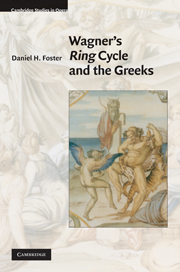Book contents
- Frontmatter
- Contents
- List of musical examples
- Preface
- Acknowledgments
- Introduction
- Part I Epic
- Part II Lyric
- Part III Drama
- Epilogue: Time, the Ring, and Performance Studies
- Appendices: Wagner's primary and secondary sources
- Appendix A Wagner's primary sources
- Appendix B Secondary scholarship by authors Wagner knew personally
- Appendix C Secondary scholarship by authors Wagner knew by reputation or by reading
- Notes
- Bibliography
- Index
Appendix B - Secondary scholarship by authors Wagner knew personally
from Appendices: Wagner's primary and secondary sources
Published online by Cambridge University Press: 07 May 2010
- Frontmatter
- Contents
- List of musical examples
- Preface
- Acknowledgments
- Introduction
- Part I Epic
- Part II Lyric
- Part III Drama
- Epilogue: Time, the Ring, and Performance Studies
- Appendices: Wagner's primary and secondary sources
- Appendix A Wagner's primary sources
- Appendix B Secondary scholarship by authors Wagner knew personally
- Appendix C Secondary scholarship by authors Wagner knew by reputation or by reading
- Notes
- Bibliography
- Index
Summary
The following list contains the names and works (whenever possible) of those classical scholars one can prove, by consulting his writings or his conversations, that Wagner knew personally. Because of the prominent role they played in his thinking about the Greeks, some of these authors' entries are longer than others – for example, Nietzsche's entry is the longest.
Apel, Johann August. From his youth onward Wagner knew and respected Johann August Apel, the father of his boyhood friend, Theodor Apel. The senior Apel's contribution to Wagner's understanding of the Greeks included both creative and scholarly works. On the scholarly side, Wagner studied Apel's book on Greek poetic meter, Metrik, and on the more creative side, the poet in Wagner was influenced by Apel's poetic output, especially Polyïdos and Die Aitolier. In his “Autobiographical Sketch” Wagner even goes so far as to say that it was through his acquaintance with these and similar poetic works by Apel that he felt “urged” to “sketch out tragedies on the models of the Greeks.” Wagner considered Apel “the master of metrical forms and reviver of Greek verse forms.”
Curtius, Ernst and Wolfgang Helbig. These two men were archaeologists Wagner knew briefly while in Rome. While very little can be said about Wagner's interactions with Curtius and Hebig, the little that can be said gives one some insight into what Wagner thought about archaeology.
- Type
- Chapter
- Information
- Wagner's Ring Cycle and the Greeks , pp. 276 - 283Publisher: Cambridge University PressPrint publication year: 2010



